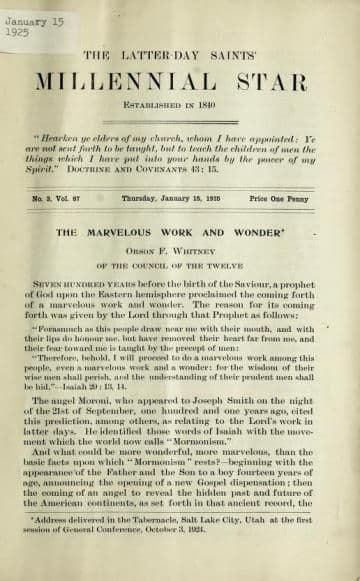Magazine
The Bible and Other Scriptures

Title
The Bible and Other Scriptures
Magazine
The Latter Day Saints' Millennial Star
Publication Type
Magazine Article
Year of Publication
1925
Authors
Talmage, James E. (Primary)
Pagination
37–39
Date Published
15 January 1925
Volume
87
Issue Number
3
Abstract
The LDS church accepts both the Bible and the Book of Mormon to be the word of God. The Book of Mormon, however, has received a more correct translation than has the Bible.
THE BIBLE AND OTHER SCRIPTURES
James E. Talmage
OF THE COUNCIL OF THE TWELVE
We believe the Bible to be the word of God, as far as it is translated correctly. We also believe the Book of Mormon to be the word of God. (Articles of Faith, No. 8).
The Church of Jesus Christ of Latter-day Saints accepts the Holy Bible for just what it purports to be, nothing less, nothing more. Taken as a whole the Holy Bible is a collection of sacred and historical writings, depicting though incompletely the divine dealings with mankind on the Eastern Hemisphere from the creation down to about the first century after Christ. The Old Testament contains a brief record of pre-Mosaic time, and largely a history of the Semitic people or Hebrews, as they lived under the law of Moses. The New Testament is distinctively the Scripture of the Gospel as contrasted with the Law, and is devoted to the earthly ministry of the Saviour and to the growth of His Church under apostolic administration. The compilation as it now stands is the work of men, and our modern translations from the original Hebrew of the Old Testament and Greek of the New have been made by skilled linguists and learned theologians.
But the wisdom of even the wisest of men may be faulty, and the understanding of the prudent may be biased and dangerously
imperfect. The many revisions and successive versions of the Bible, made as the errors of the earlier renditions became
strikingly apparent, testify to the unreliability of scholarship in the translation of Sacred Writ. Moreover, it is an indisputable fact that the compilation of books constituting our present version is incomplete; for within the Bible itself more than a score of books, epistles, or other writings not included arc mentioned, and generally in such a way as to show that those lost Scriptures were considered authentic and genuine. Furthermore, numerous Biblical passages arc tinged with what scholars call “gloss”—that is wording intended to convey the private interpretation of the translator.
The Latter-day Saints openly proclaim their reservation as to incorrect translation. We are in harmony with all able and earnest students of the Scriptures in accepting the Bible as the word of God, only so far as it is translated correctly.
But we hold that there are now extant other Scriptures, of equal validity with those of the Holy Bible, and in no sense in conflict therewith nor a substitute thereof. For nearly six centuries before and about four centuries after the birth of Christ, the American continent was inhabited by a detached body of Israelites, who developed into powerful nations. Their existence was unknown to the people of the East. Is it unreasonable to believe that unto the western fold God sent His shepherds, and that prophets officiated among them by divine appointment?
That the Book of Mormon would be rejected by many on the specious and untenable claim that they already had a Bible and that there could be no other Scriptures, the Lord foretold by the mouth of the prophet Nephi:
“And because my words shall hiss forth—many of the Gentiles shall say: A Bible! A Bible! We have got a Bible, and there cannot be any more Bible. … Know ye not that there are more nations than one?
Know ye not that I, the Lord your God, have created all men, and that I remember those who are upon the isles of the sea; and that I rule in the heavens above and in the earth beneath; and I bring forth my word unto the children of men, yea, even upon all the nations of the earth? … Wherefore, I speak the same words unto one nation like unto another. And when the two nations shall run together the testimony of the two nations shall run together also. And 1 do this that I may prove unto many that I am the same yesterday, to-day, and forever: and that I speak forth my words according to mine own pleasure. And because that I have spoken one word ye need not suppose that I cannot speak another; for my work is not yet finished; neither shall it be until the end of man, neither from that time henceforth and forever.”— Book of Mormon, 2 Nephi, chap. 29.
It is noticeable that we make no reservation respecting the Book of Mormon on the ground of incorrect translation. To do so would be to ignore attested facts as to the bringing forth of that book. Joseph Smith the prophet, seer, and revelator, through whom the ancient record has been translated into our modern tongue, expressly avers that the translation was effected through the gift and power of God, and is in no sense the product of linguistic scholarship.
The Bible in its original form, and in modern versions so far as correctly translated, contains the Word of God. Without it, the world would be plunged into spiritual gloom. Nevertheless there are other Scriptures already published, and yet others are to come.
Subject Keywords
Bibliographic Citation
Terms of use
Items in the BMC Archive are made publicly available for non-commercial, private use. Inclusion within the BMC Archive does not imply endorsement. Items do not represent the official views of The Church of Jesus Christ of Latter-day Saints or of Book of Mormon Central.